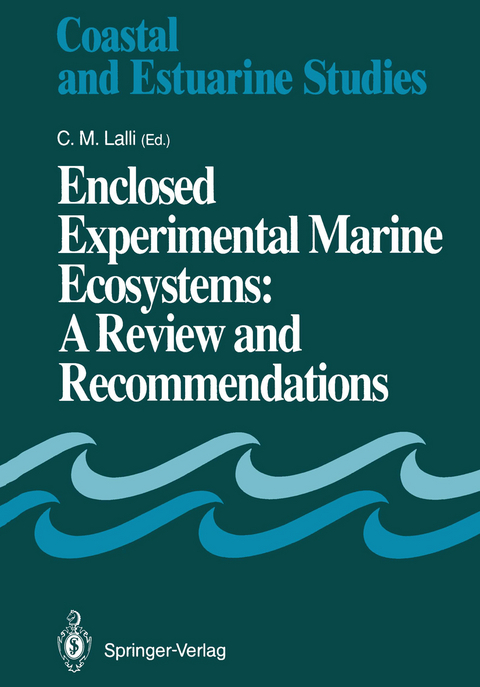
Enclosed Experimental Marine Ecosystems: A Review and Recommendations
A Contribution of the Scientific Committee on Oceanic Research Working Group 85
Seiten
2012
|
Softcover reprint of the original 1st ed. 1990
Springer-Verlag New York Inc.
978-1-4684-6403-0 (ISBN)
Springer-Verlag New York Inc.
978-1-4684-6403-0 (ISBN)
The application of mesocosms, defined in this report as artificial 3 3 experimental enclosures ranging in size from 1 m to 10m , to address various problems in the marine sciences has been a relatively recent development. The application of the technology was dictated by the realization that many important ocean processes and interactions cannot be fully understood from observations in the natural environment or in smaller enclosures. Such studies involve, for example, determining the interactions between, and energy transfer from, one trophic level to another, the biogeochemical cycling of elements and compounds, etc. These and similar interactions and rate processes cannot normally be established in situations (nature) where the detection and quantification of rate processes are confused by advection and/or the inability to study the same populations over time. In the case of microcosms, mixed populations of primary producers, consumers, and carnivores cannot be maintained, in balance, for a sufficient length of time to determine normal interactions between the various components of these trophic levels. This report, prepared by SCOR Working Group 85, critically examines past applications of mesocosms to ocean research, though there is no attempt to comprehensively review all literature relevant to the subject. Further, the report outlines some important advances emanating from their use and provides recommendations for future applications. It constitutes the first of two reports from the Working Group (see Introduction).
1 Introduction.- 2 Different Types of Ecosystem Experiments.- 3 Marine Microcosms: Small-Scale Controlled Ecosystems.- 4 Pelagic Mesocosms: I. Food Chain Analysis.- 5 Pelagic Mesocosms: II. Process Studies.- 6 Benthic Mesocosms: I. Basic Research in Soft-bottom Benthic Mesocosms.- 7 Benthic Mesocosms: II. Basic Research in Hard-bottom Benthic Mesocosms.- 8 Specific Application of Meso- and Macrocosms for Solving Problems in Fisheries Research.- 9 Application of Mesocosms for Solving Problems in Pollution Research.- 10 Baltic Sea Eutrophication: A Case Study using Experimental Ecosystems.- 11 Mesocosms: Statistical and Experimental Design Considerations.- 12 The Use of Mathematical Models in Conjunction with Mesocosm Ecosystem Research.
| Reihe/Serie | Coastal and Estuarine Studies ; 37 |
|---|---|
| Zusatzinfo | X, 218 p. |
| Verlagsort | New York, NY |
| Sprache | englisch |
| Maße | 170 x 244 mm |
| Themenwelt | Mathematik / Informatik ► Mathematik ► Angewandte Mathematik |
| Studium ► Querschnittsbereiche ► Epidemiologie / Med. Biometrie | |
| Naturwissenschaften ► Biologie ► Biochemie | |
| Naturwissenschaften ► Biologie ► Ökologie / Naturschutz | |
| Naturwissenschaften ► Chemie | |
| Technik ► Umwelttechnik / Biotechnologie | |
| ISBN-10 | 1-4684-6403-5 / 1468464035 |
| ISBN-13 | 978-1-4684-6403-0 / 9781468464030 |
| Zustand | Neuware |
| Haben Sie eine Frage zum Produkt? |
Mehr entdecken
aus dem Bereich
aus dem Bereich
ein überfälliges Gespräch zu einer Pandemie, die nicht die letzte …
Buch | Hardcover (2024)
Ullstein Buchverlage
24,99 €


